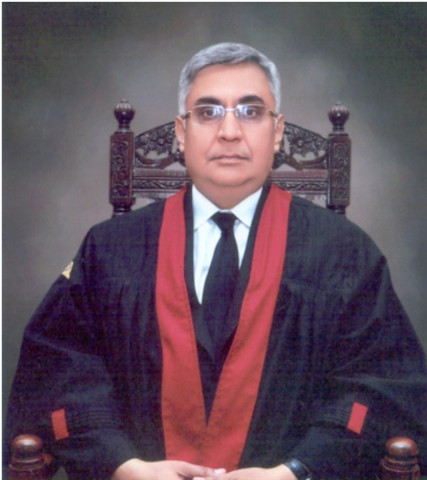Judge under SJC scrutiny over Panama papers, denies evading taxes
LHC’s Justice Farrukh Irfan says he disassociated himself from offshore firm before his oath as a judge

Justice Farrukh Irfan Khan. PHOTO: SC
“It is also contended that there was no requirement of disclosure of foreign properties to Pakistan tax authorities and the properties situated in Orlando, Florida were mortgaged before his elevation as a LHC judge and through a gift deed dated 3rd February 2010; those properties were gifted to his brother Muhammad Ahmad Irfan Khan,” says an affidavit.
Nadeem Akhtar Sheikh, a Chartered Accountant, who is handling corporate and tax matters of Irfan Group of companies as well as personal tax matters of Justice Khan, has submitted the affidavit to the SJC, which is hearing a case related to the judge’s alleged misconduct.
The affidavit says the LHC judge had disassociated himself from the Irfan Group and resigned from all positions before his oath as a judge on February 20, 2010.
“As per the normal practice, the charges in directorship and shareholdings were notified to the SECP [Securities and Exchange Commission of Pakistan] at the time of filing the Returns on Form-A and Form 29,” it added.
The reply says Justice Khan established practice in IP rights registration in the UAE and in doing so he transferred the ownership of Irfan & Irfan to his brother Hasan Irfan Khan in the year 2001.
“Being a leading lawyer then due to the trust and faith of his international clients, his practice flourished in the UAE and funds generated through this practice were also repatriated to Pakistan and partially invested in buying properties abroad. There was no requirement of disclosure of foreign properties to Pakistan tax authorities,” says the affidavit.
It says the income earned in the UAE was exempted from taxation in Pakistan under the double taxation treaty entered between two countries. Justice Khan did not earn income in Pakistan during those years.
“He filed nil income returns for the relevant years with the FBR [Federal Board of Revenue] through me and these were accepted without any objection,” say the chartered accountant. He says Pakistani equivalent to crores of rupees were transferred/repatriated to Pakistan through legal banking channels.
“In the consequences of his nomination as a judge of the LHC, the practice in the UAE was gifted by Justice Farrukh Irfan to his daughter Maria Farrukh through a gifted deed dated 3rd February 2010.”
It says Anrol Limited and Trnmalin Limited are not secret companies but legitimate Single Purpose Vehicles (SPV). There was no reporting requirement to report these companies to tax authorities at the relevant times due to the fact that he had no income chargeable to tax in Pakistan.
Earlier, a five-judge SJC led by the Chief Justice of Pakistan (CJP) Mian Saqib Nisar resumed hearing of the case in an open court on Thursday. Additional Attorney General Chaudhry Amir Rehman produced prosecution witness who submitted tax returns of LHC judge for the years 2001-02.
Hamid Khan, counsel for LHC judge, objected to it by saying that his client was not performing as a judge at that time. However, the council overruled his objection and allowed Rehman to produce the returns for the years prior to his becoming a judge. The council rejected Hamid Khan’s plea to grant sufficient time to produce the witnesses who are abroad.
The council has already asked the LHC judge to produce all the remaining evidence (oral/ documentary) on January 8. If the respondent judge intends to file the affidavits of witnesses, he must do so two days before January 8 with an advance copy to the additional attorney general for Pakistan; otherwise, no witness shall be examined.
During the hearing, the council asked the LHC judge’s attorney to give money trail for establishing offshore properties. Hearing of the case is adjourned till January 8.



















COMMENTS
Comments are moderated and generally will be posted if they are on-topic and not abusive.
For more information, please see our Comments FAQ